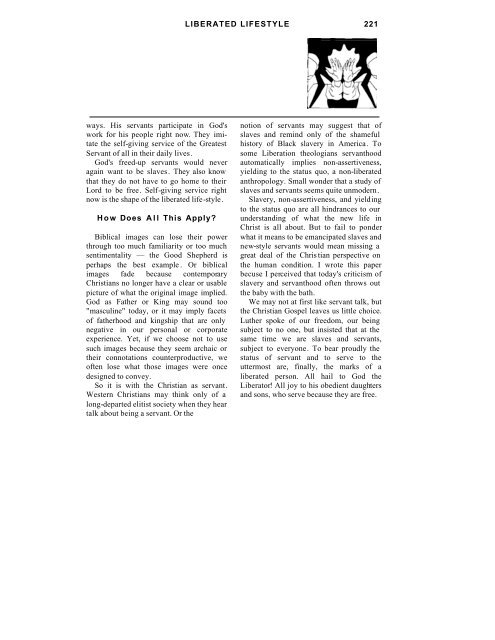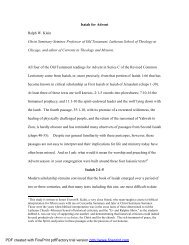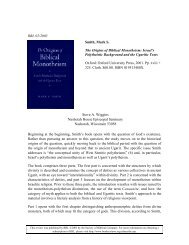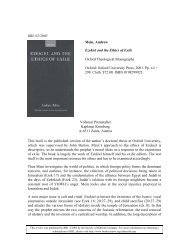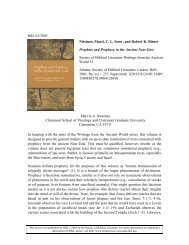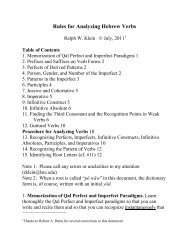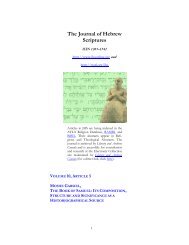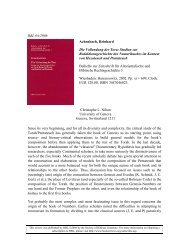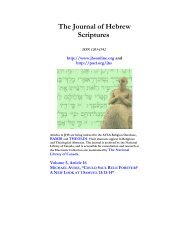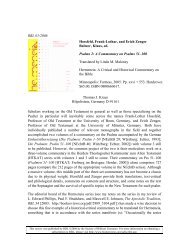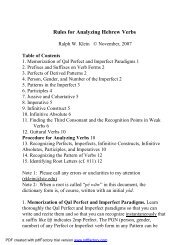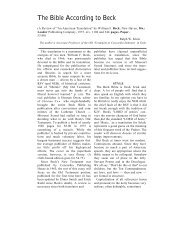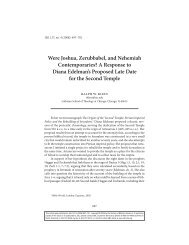A Liberated Lifestyle: Slaves and Servants in Biblical Perspective
A Liberated Lifestyle: Slaves and Servants in Biblical Perspective
A Liberated Lifestyle: Slaves and Servants in Biblical Perspective
You also want an ePaper? Increase the reach of your titles
YUMPU automatically turns print PDFs into web optimized ePapers that Google loves.
ways. His servants participate <strong>in</strong> God's<br />
work for his people right now. They imitate<br />
the self-giv<strong>in</strong>g service of the Greatest<br />
Servant of all <strong>in</strong> their daily lives.<br />
God's freed-up servants would never<br />
aga<strong>in</strong> want to be slaves. They also know<br />
that they do not have to go home to their<br />
Lord to be free. Self-giv<strong>in</strong>g service right<br />
now is the shape of the liberated life-style.<br />
How Does All This Apply?<br />
<strong>Biblical</strong> images can lose their power<br />
through too much familiarity or too much<br />
sentimentality — the Good Shepherd is<br />
perhaps the best example . Or biblical<br />
images fade because contemporary<br />
Christians no longer have a clear or usable<br />
picture of what the orig<strong>in</strong>al image implied.<br />
God as Father or K<strong>in</strong>g may sound too<br />
"mascul<strong>in</strong>e" today, or it may imply facets<br />
of fatherhood <strong>and</strong> k<strong>in</strong>gship that are only<br />
negative <strong>in</strong> our personal or corporate<br />
experience. Yet, if we choose not to use<br />
such images because they seem archaic or<br />
their connotations counterproductive, we<br />
often lose what those images were once<br />
designed to convey.<br />
So it is with the Christian as servant.<br />
Western Christians may th<strong>in</strong>k only of a<br />
long-departed elitist society when they hear<br />
talk about be<strong>in</strong>g a servant. Or the<br />
LIBERATED LIFESTYLE 221<br />
notion of servants may suggest that of<br />
slaves <strong>and</strong> rem<strong>in</strong>d only of the shameful<br />
history of Black slavery <strong>in</strong> America. To<br />
some Liberation theologians servanthood<br />
automatically implies non-assertiveness,<br />
yield<strong>in</strong>g to the status quo, a non-liberated<br />
anthropology. Small wonder that a study of<br />
slaves <strong>and</strong> servants seems quite unmodern.<br />
Slavery, non-assertiveness, <strong>and</strong> yield<strong>in</strong>g<br />
to the status quo are all h<strong>in</strong>drances to our<br />
underst<strong>and</strong><strong>in</strong>g of what the new life <strong>in</strong><br />
Christ is all about. But to fail to ponder<br />
what it means to be emancipated slaves <strong>and</strong><br />
new-style servants would mean miss<strong>in</strong>g a<br />
great deal of the Chris tian perspective on<br />
the human condition. I wrote this paper<br />
becuse I perceived that today's criticism of<br />
slavery <strong>and</strong> servanthood often throws out<br />
the baby with the bath.<br />
We may not at first like servant talk, but<br />
the Christian Gospel leaves us little choice.<br />
Luther spoke of our freedom, our be<strong>in</strong>g<br />
subject to no one, but <strong>in</strong>sisted that at the<br />
same time we are slaves <strong>and</strong> servants,<br />
subject to everyone. To bear proudly the<br />
status of servant <strong>and</strong> to serve to the<br />
uttermost are, f<strong>in</strong>ally, the marks of a<br />
liberated person. All hail to God the<br />
Liberator! All joy to his obedient daughters<br />
<strong>and</strong> sons, who serve because they are free.


